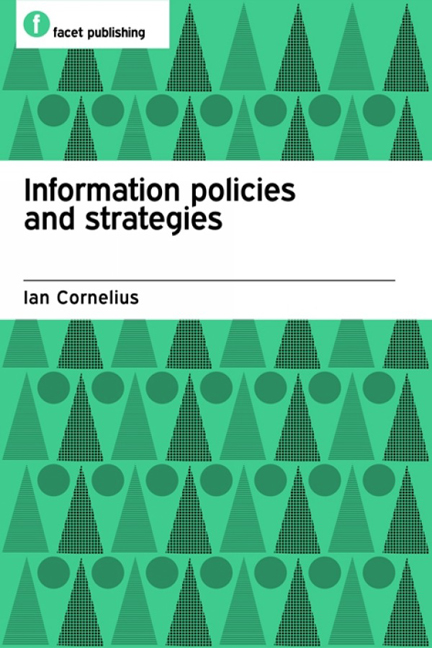Book contents
- Frontmatter
- Dedication
- Contents
- Preface
- 1 Introduction
- Part 1 Contexts for information policy
- Part 2 Information policy sectors
- 5 Censorship, freedom of speech and freedom of expression
- 6 Arguments for protecting speech
- 7 Privacy and data protection
- 8 Freedom of information
- 9 Intellectual property
- Part 3 Conclusion
- References and reading list
- Index
8 - Freedom of information
from Part 2 - Information policy sectors
Published online by Cambridge University Press: 08 June 2018
- Frontmatter
- Dedication
- Contents
- Preface
- 1 Introduction
- Part 1 Contexts for information policy
- Part 2 Information policy sectors
- 5 Censorship, freedom of speech and freedom of expression
- 6 Arguments for protecting speech
- 7 Privacy and data protection
- 8 Freedom of information
- 9 Intellectual property
- Part 3 Conclusion
- References and reading list
- Index
Summary
FREEDOM OF INFORMATION is about improving public access to government information. It is different in character to data protection and also to censorship and freedom of speech. We should be clear about the terms we are using, as there is often confusion between freedom of information and freedom of speech and expression. We might also include ‘intellectual freedom’ in this. Intellectual freedom is a term similar to freedom to read but being more inclusive and covering more, and concerns the right to read or view as we wish, without censorship. Freedom of speech and expression are the right to make utterances without censorship; they are obviously closely related to intellectual freedom and the freedom to read.
Freedom of information is different, although it does relate to restrictions on the right to read, as it is the name given first to campaigns, and latterly to laws, to enforce governments to release for public view information they have collected and hold. The matter of increased government secrecy has become a major issue in the last 30 years but has been the subject of campaigns for much longer. The cause of the concern is familiar: the increased volume of government activity, the extension of government action into many more areas of life, the effect of nearly a century of wars or near wars for most of the advanced industrial nations with the attendant paranoia about national security, and increased dem11ocratic concern about the accountability of those with power. The movement to increase government accountability is, like the movement to secure data protection, pursued from the ground up, and, as with data protection, the legislation was resisted and then introduced with reluctance. The difference is that in the case of freedom of information the legislation is aimed solely at the governments themselves and for its implementation is dependent on government goodwill and willingness to reveal what information it holds. The information is of two broad types, which overlap: the information governments collect, and that which they generate from their own work – the working documents of government.
- Type
- Chapter
- Information
- Information Policies and Strategies , pp. 143 - 156Publisher: FacetPrint publication year: 2010



